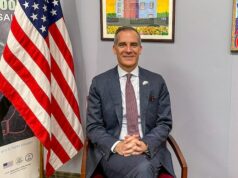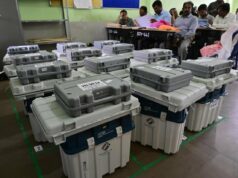India says J&K, Ladakh its integral, inalienable parts, slams Pakistan for raking Kashmir issue at UN

India has just brushed aside Pakistan’s envoy raising the Kashmir issue and said no amount of misinformation, rhetoric and propaganda from any country can deny the fact that the union Territories of Jammu and Kashmir and Ladakh “were, are and will always remain” an integral and inalienable part of India. No amount of misinformation, rhetoric and propaganda from any country can deny this fact.
Pakistan seeks to rake up the Jammu and Kashmir issue at UN platforms and other some international fora irrespective of the agenda of the meetings even as the Simla agreement binds Pakistan to resolve all outstanding issues bilaterally. Pakistan’s Permanent Representative at the UN Munir Akram referred to Jammu and Kashmir in his remarks at the UNGA meeting.
In fact it’s time to clearly tell the World that India always retains the option to nullify the British drawn Radcliffe Line and what to talk of Pakistan, even the Britain will not be able to do a thing about it.
Speaking at the UN General Assembly plenary on ‘Use of the veto’ on Wednesday, Pratik Mathur, Counsellor, Permanent Mission of India to the United Nations, also spoke on the adoption of the ‘veto initiative’ by the Assembly said India’s position has been consistent and clear.
Mathur noted that a year has passed since the adoption of the ‘veto initiative’ by the UNGA. “India’s position on veto has been consistent and clear,” he said.
“As we all are aware, UNGA had unanimously agreed vide decision 62/557 in 2008 that all five aspects of UNSC reform, including on the question of veto would be decided in a comprehensive manner and therefore no single cluster could be addressed in isolation. The veto resolution, though adopted by consensus, unfortunately, reflected a piecemeal approach to UNSC reform, thereby highlighting one aspect, ignoring root cause of the problem,” he said.
Mathur made observations regarding the substantive aspect of the exercise of veto in the Security Council.
“All five permanent Members have used the veto over the last 75 years to achieve their respective political ends,” he said and cited remarks from African countries who have stated that “the veto as a matter of principle should be abolished, however, as a matter of common justice, it should be extended to new permanent members so long as it continues to exist.”
“The privilege of using the veto has been vested to only five member states. As rightly called out by our African brothers, it goes against the concept of sovereign equality of states and only perpetuates the mindset of the Second World War, to the victor belongs the spoils,” Mathur said.
He said either all nations are treated equally in the context of voting rights or else the new permanent members must also be given the veto.
“Extension of veto to new members, in our view, will have no adverse impact on the effectiveness of an enlarged Council. Moreover, the exercise of veto is driven by political considerations, not by moral obligations. As long as it exists, the member state or member states, who can exercise the veto, will do so, irrespective of the moral pressure, as we have seen in the recent past,” Mathur said.
“Therefore, we need to address all five aspects of UNSC reform, including the question of veto, in a comprehensive manner, through clearly defined timelines, in the IGN process. India is committed to support any initiative that genuinely furthers the objective of achieving meaningful and comprehensive reform of the key elements of the global multilateral architecture,” he added.



